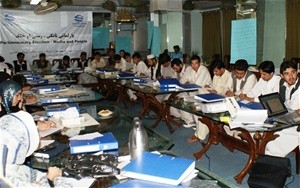
Journalists who attended the Kandahar trainings work for independent local media, nationally networked TV and radio stations, and international media organizations.
USAID/Afghanistan
Journalists turn out in great numbers for parliamentary elections media training in Kandahar.
20 SEPTEMBER 2010 | KANDAHAR, AFGHANISTAN
It is not easy for journalists in Afghanistan’s south to travel to major cities for media training. Stories abound of young journalists confronted at illegal checkpoints by Taliban and other anti-government groups, where the greatest fear is that a search will reveal their journalist’s card. However, many journalists are willing to take the risk because they are committed to building a free press and an informed populace.
More than 60 journalists from southern Afghanistan's most insecure provinces traveled to Kandahar City for a USAID-supported parliamentary elections media training seminar in late May. The training provided participants with the skills and approaches needed for fair, independent, accurate, and ethical reporting of Afghanistan’s parliamentary elections. It also exposed journalists to the laws and regulations that govern the electoral process, which is managed by Afghanistan’s Independent Elections Commission. In highly interactive sessions, trainers led spirited discussions and analysis on recent elections reporting by Afghan media.
Twenty-five members of the press, including two women, registered for advanced parliamentary elections training and 36 (13 women) attended basic training.
Journalism is a particularly challenging career for women in the south. “I have four colored burqas,” said one female journalist who works for a TV station in Kandahar City. “When I go to my office, I change my burqa four times in a day to avoid attention. But I still love my job and journalism, and I want to continue my work,” she said.
The newly-established Kandahar Press Club welcomed the parliamentary elections media courses, which have also been held in centers across Afghanistan, including regional training hubs in Mazar-i Sharif and Jalalabad. By the end of June, the program will train more than 260 journalists in parliamentary elections reporting at both basic and advanced levels.
Journalists at the courses commented that no organization had previously ventured to Kandahar to deliver journalism training. Nai, an Afghan non-governmental organization, organized the training in cooperation with its international partner Internews. USAID provides funding to Internews to implement a program that supports media development in Afghanistan.







Comment
Make a general inquiry or suggest an improvement.